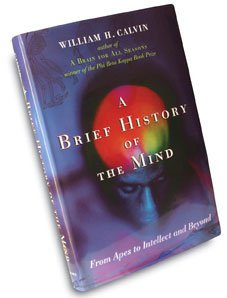The Great Brain Boom: Understanding How Humans Think
The author explores the possible reasons why humans think and communicate the way we do.

Our brain size expanded dramatically 750,000 years ago, but it was another 700,000 years before we started to act and communicate like modern humans. What caused the "brain boom"? Scientist William H. Calvin offers some intriguing suggestions in his latest book, A Brief History of the Mind. The probable cause: a transition from simple noun/verb sentences to more complex statements that require "the little words of grammar," like to, from, and at, to even more structured language that permits us to think abstractly, pedagogically, and even philosophically.
Can we again take advantage of the brain's flexibility -- its plasticity -- to propel us forward? Possibly. Calvin suggests that education now is empirical, the way medicine was in the eighteenth century, and isn't based (much) on the science of how the brain works.
But advances in our understanding of the brain and mind can change this. "Once education has the techniques and technology to incorporate what is being learned about brain plasticity and inborn individual differences, we are likely to produce many more adults of unusual ability, able to juggle twice as many concepts at once, able to follow a longer chain of reasoning, able to shore up the lower floors of their mental house of cards to allow fragile new levels to be tried out." Good news for anyone dismayed at the prospect of stagnation in the education system, or of sudden, cataclysmic global changes.
A Brief History of the Mind:
From Apes to Intellect and Beyond
By William H. Calvin / Oxford University Press / $26